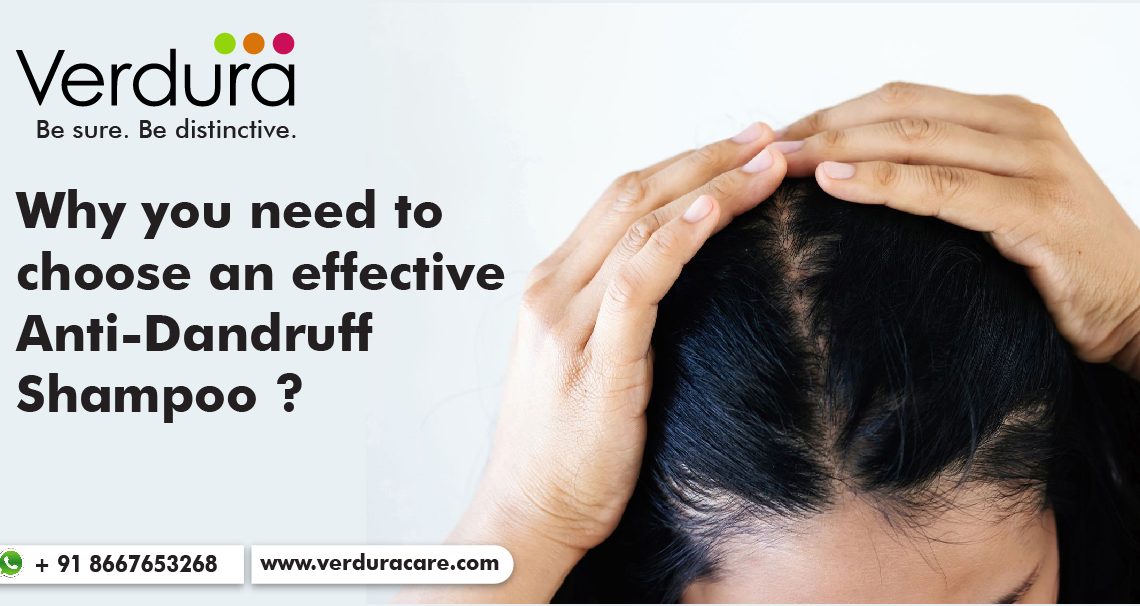Why you need to choose an effective anti-dandruff shampoo ?

Introduction
Dandruff, with its itchy flakes and persistent presence, can be a frustrating and embarrassing condition. Luckily, there is a potent weapon in our hair care arsenal that can help combat dandruff effectively: shampoo. In this blog, we will look into the role of shampoo in controlling dandruff, exploring its key ingredients, proper usage, and additional tips to manage this common scalp issue.
Understanding Dandruff
Before we come into the role of shampoo, it’s essential to understand what dandruff is.
Dandruff is a chronic scalp condition characterized by the excessive shedding of dead skin cells. It can be caused by various factors, including a yeast-like fungus called Malassezia, sebum production, sensitivity to hair products, or a combination of these factors. Dandruff presents as white or yellow flakes, accompanied by itching, redness, and irritation.
The Role of Shampoo in Dandruff Control
Shampoo plays a crucial role in managing dandruff by addressing the underlying causes and providing relief from its symptoms. Here’s how it achieves this:
- Cleansing and Exfoliation: Shampoos designed for dandruff control contain cleansing agents that effectively remove excess oil, dirt, and dead skin cells from the scalp. This helps to eliminate the environment in which the dandruff-causing fungus thrives and reduces the buildup of flaky skin.
- Anti-Fungal Properties: Many dandruff shampoos contain antifungal ingredients such as ketoconazole, selenium sulfide, zinc pyrithione, or pyrithione zinc. These active ingredients target the Malassezia fungus, helping to reduce its population and alleviate dandruff symptoms.
- Soothing and Moisturizing: Dandruff shampoos often include soothing agents like aloe vera, tea tree oil, or menthol to calm an irritated scalp and alleviate itching and redness. They may also contain moisturizing ingredients like glycerin or natural oils to prevent excessive dryness, which can exacerbate dandruff.
Choosing the Right Shampoo
With a wide array of dandruff shampoos available, it’s crucial to select one that suits your specific needs. Consider the following factors:
- Active Ingredients: Look for shampoos containing antifungal agents such as ketoconazole, selenium sulfide, zinc pyrithione, or pyrithione zinc. These ingredients have been clinically proven to combat dandruff effectively.
- Scalp Sensitivity: If you have a sensitive scalp, opt for a gentle and fragrance-free shampoo to minimize irritation. Natural ingredients like tea tree oil or rosemary extract can provide soothing benefits without causing additional sensitivity.
- Frequency of Use: Some dandruff shampoos are designed for daily use, while others are recommended for two to three times a week
Use Verdura anti scaling scalp shampoo with Climbazole and Zinc pyrithione the dual anti dandruff agents to keep the scalp dandruff free and clean in this summer season.
Usage and Additional Tips
To make the most of your dandruff shampoo and ensure effective control, keep the following tips in mind:
- Pre-Wash Preparation: Gently brush your hair before washing to loosen any flakes and enhance the shampoo’s penetration into the scalp.
- Massage and Rinse: While shampooing, massage the product into the scalp using gentle circular motions to stimulate circulation and improve absorption. Rinse thoroughly to eliminate all traces of shampoo.
- Follow Instructions: Read and follow the manufacturer’s instructions for the specific shampoo you are using. Some may require a certain duration of application or recommend leaving the shampoo on the scalp for a few minutes before rinsing.
- Consistency is Key: Consistently using the dandruff shampoo as recommended is crucial for effective control. Results may not be immediate, so be patient and continue using the shampoo regularly over a sustained period.
- Avoid Overuse: While it’s important to use the dandruff shampoo consistently, be cautious not to overuse it. Excessive shampooing can strip the scalp of its natural oils, leading to dryness and potential scalp irritation.
- Supplementary Hair Care: Alongside using a dandruff shampoo, maintain a healthy hair care routine. Use a conditioner specifically designed for the scalp to nourish and moisturize your hair without compromising the efficacy of the dandruff shampoo.
- Lifestyle and Diet: Certain lifestyle factors and dietary choices can impact the health of your scalp. Stress, inadequate sleep, and a poor diet may contribute to dandruff. Prioritize stress management, get sufficient sleep, and consume a balanced diet rich in vitamins and minerals to support scalp health.
- Seek Professional Advice: If your dandruff persists despite consistent use of dandruff shampoos or if it worsens over time, it’s advisable to consult a dermatologist or a healthcare professional. They can assess your specific condition, provide additional guidance, and recommend suitable treatment options.
Conclusion
Dandruff can be effectively managed with the help of shampoos specifically formulated to combat this common scalp condition. By understanding the role of shampoo in controlling dandruff, selecting the right product, following proper usage techniques, and complementing it with a healthy hair care routine, you can bid farewell to those pesky flakes and enjoy a healthier, dandruff-free scalp. Remember, consistency and patience are key to achieving long-term results and maintaining a healthy scalp and hair.